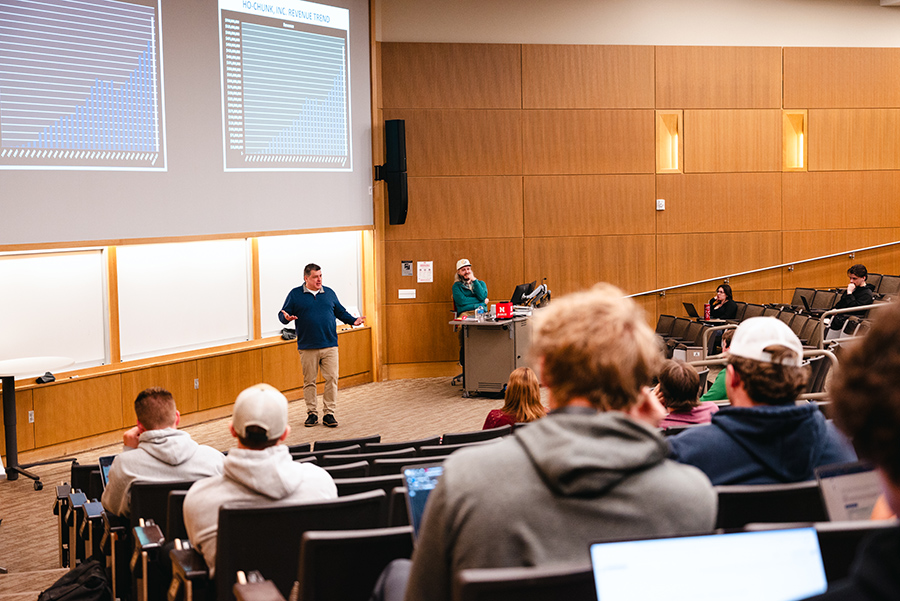As a high school senior, Lance Morgan, '90, CEO and president of Ho-Chunk, Inc., applied to only one school: Harvard University. Needing a new plan after not being accepted, he studied economics at the University of Nebraska–Lincoln before earning an Ivy League law degree to help him provide job opportunities and long-term economic development for the Winnebago Tribe of Nebraska.
 Morgan speaks to students about his educational and career experience.
Morgan speaks to students about his educational and career experience.
"My pride and overconfidence at age 17 came back to get me so I applied to Nebraska. I had no money so joined the United States Army Reserve, and got 50% of my tuition paid, the GI Bill and a Pell Grant," he said. "I went from thinking I was going to Harvard to basic training and shaving my head in a day. I don't think I would have been emotionally ready then for Harvard."
Originally from North Omaha, Nebraska, Morgan said the university helped him grow up and become an adult. He shared about his education and career while serving as the College of Business Alumni Master in April. Selected each year to return to campus to meet with students as part of a Nebraska Alumni Association program, the Alumni Masters are proven leaders in their respective fields.
"I took Advanced Placement (AP) courses in high school but didn't sign up for the year-end tests (to earn college credit), as I didn't think Harvard would accept them. When I had to take those courses again at Nebraska, I was thinking that I was naturally gifted. Then everything I took was new my sophomore year, and my laissez-faire approach to life led to a grade of 69 on a marketing test," he said. "I worked for my dad who was a roofer, so I always say that I risked being the smartest roofer in Omaha."
Morgan set some new rules for himself and focused more on his academics. He set his sights on corporate law and applied to the Ivy League school again with a Nebraska degree and was accepted into Harvard Law School.
"For a guy who studied and crammed at the last second and lived my life in a carefree fashion in between, it was definitely challenging at Harvard. I tried to read and study everything, and by November, I had developed an eye twitch because of the stress," he said. "I remember watching a commercial where a college was sharing how they had two Rhodes Scholars, and there were two on my rugby team alone at Harvard."
Though a "culture shock," Morgan adapted to his environment. He joined a rugby team and played basketball in the afternoon to help combat stress and build community.
He also interned with the Winnebago tribe and wrote a paper about comparative economics between Native Americans or non-Natives and structuring a tribal economics corporation.
"Looking back on the paper, it's not that good but it was the seeds of something. It became the basis for Ho-Chunk Inc.," said Morgan, referring to the company founded in 1994 to help the Winnebago people by creating jobs and diversifying the tribe's revenue.
Hired by a law firm in Minneapolis after graduation, he was assigned a case for the Winnebago tribe.
"We won about $24 million as the company that was managing their casino was taking 40% of the profits, and that was too much. In the end, $9 million of that funded Ho-Chunk Inc.," he said.
With the demand for tribal law and tribal economics, Morgan quit his job to start leading the company, named after the traditional name for the Winnebago people — Hochungra, often shortened to Ho-Chunk. He also opened a firm specializing in tribal law.
"I showed up at the dawn of a new era. Just lucky, but it allowed us to be innovative," he said. "Our mission is to provide job opportunities and long-term economic industry for the tribe. We'll do $520 million in revenue this year and are about to add more employees that will push us over 2,000," he said. "We've managed to build this company with people from our town. It was one of the poorest places in Nebraska 30 years ago and so it goes to show the natural talent available in Nebraska."
In the last 20 years, the growth and median income of a family on the reservation went from $29,000 to $56,000. The number of families living below the median has dropped by six and the number living above has grown by 186.
"The poverty that our entire family and tribe has suffered — generational poverty — makes me very focused on our success and figuring out ways to make it better. The historical record shows that when we moved to Winnebago, there was nothing. Now look at Ho-Chunk Village," he said.
His parents were the first to move into Ho-Chunk Village, the master-planned community on 40 acres of reservation developed by Ho-Chunk Inc. Morgan also owns a home there.
"What tribes lack is a long-term sense of stability, and Ho-Chunk Inc. has become an institution in our community. If you have an institution, you can create payroll, you can do good deeds for your community, you can build things and create jobs," he said.
With "gaming centering us in Lincoln and Omaha right now," Morgan has no plans to retire soon. After serving as CEO for 25 years though, he does have a succession plan.
"I've joked that someone else kicked in the door that I walked through, and the guy we've been training to succeed will have a sliding glass door that opens automatically for him to roll in," he said. "The challenge is to keep that going and plant seeds for the next generation."
Published: April 16, 2024